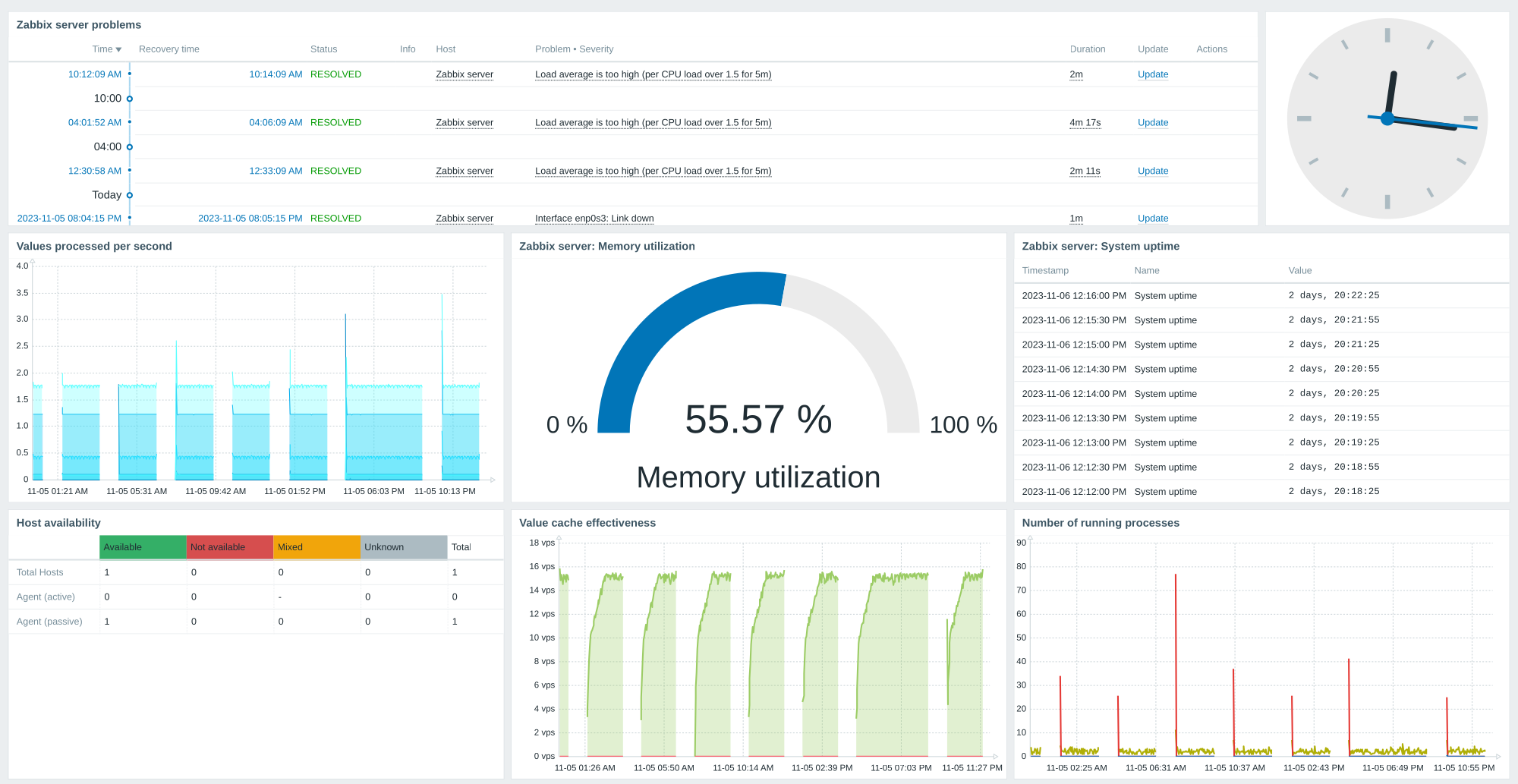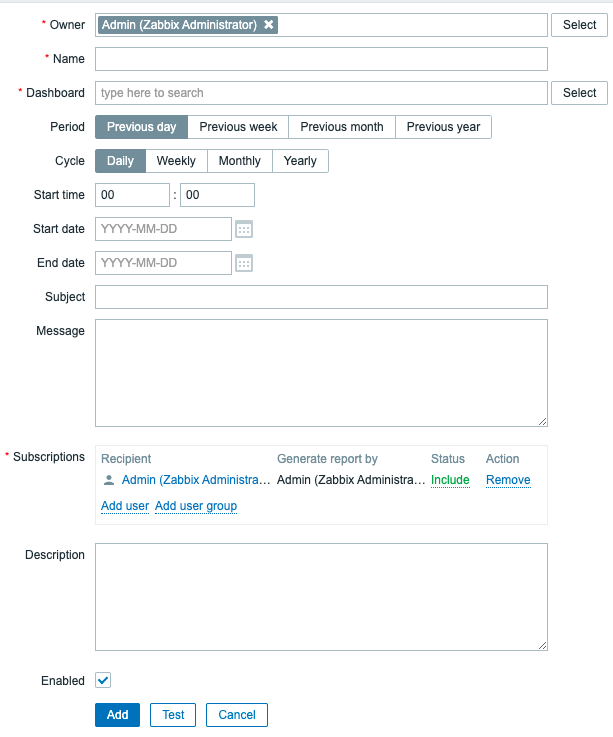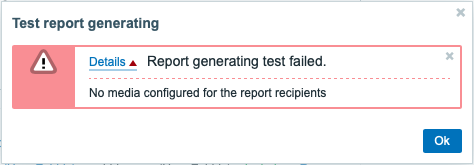Join our translation project and help translate Zabbix documentation into your native language.
14 Scheduled reports
Overview
With the Scheduled reports feature, you can set up a PDF version of a given dashboard to be sent to specified recipients at recurring intervals.

Pre-requisites:
- Zabbix web service must be installed and configured correctly to enable scheduled report generation - see Setting up scheduled reports for instructions.
- A user must have a user role of type Admin or Super admin with the following permissions:
- Scheduled reports in the Access to UI elements block (to view report settings)
- Manage scheduled reports in the Access to actions block (to create/edit reports)
To create a scheduled report in Zabbix frontend, do the following:
- Go to: Reports > Scheduled reports.
- Click Create report in the upper-right corner of the screen.
- Enter parameters of the report in the form.
You can also create a report by opening an existing one, clicking the Clone button, and then saving it under a different name.
Configuration
The Scheduled reports tab contains general report attributes.

All mandatory input fields are marked with a red asterisk.
| Parameter | Description |
|---|---|
| Owner | User that creates a report. Super admin level users are allowed to change the owner. For Admin level users, this field is read-only. |
| Name | Name of the report; must be unique. |
| Dashboard | Dashboard on which the report is based; only one dashboard can be selected at a time. To select a dashboard, start typing the name - a list of matching dashboards will appear; scroll down to select. Alternatively, you may click Select next to the field and select a dashboard from the displayed list. |
| Period | Time period for which the report will be prepared. Select the previous day, week, month, or year. |
| Cycle | Report generation frequency. The reports can be sent daily, weekly, monthly, or yearly. "Weekly" mode allows to select days of the week when the report will be sent. |
| Start time | Time of the day in the format hh:mm when the report will be prepared. Note that Zabbix server time zone will be used. |
| Repeat on | Days of the week when the report will be sent. This field is available only if Cycle is set to "Weekly". |
| Start date | Date when regular report generation should be started. |
| End date | Date when regular report generation should be stopped. |
| Subject | Subject of the report email. Supported macros: {TIME}, {TIMESTAMP}. |
| Message | Body of the report email. Supported macros: {TIME}, {TIMESTAMP}. |
| Subscriptions | List of report recipients. By default, includes only the report owner. Any Zabbix user with configured email media may be specified as a report recipient. Click Add user or Add user group to add more recipients. Click the username to edit settings: Generate report by - whether the report data should be generated based on the dashboard permissions of the current user or the recipient. Status - select "Include" to send the report to the user or "Exclude" to prevent sending the report to this user. At least one user must have the "Include" status. The "Exclude" status can be used to exclude specific users from a user group that is included. Note that users with insufficient permissions (that is, users with a role based on the Admin user type who are not members of the same user group as the recipient or report owner) will see "Inaccessible user" or "Inaccessible user group" instead of the actual names in the fields Recipient and Generate report by; the fields Status and Action will be displayed as read-only. |
| Enabled | Report status. Clearing this checkbox will disable the report. |
| Description | An optional description of the report. This description is for internal use and will not be sent to report recipients. |
Form buttons
Buttons at the bottom of the form allow to perform several operations.
 |
Add a report. This button is only available for new reports. |
 |
Update the properties of a report. |
 |
Create another report based on the properties of the current report. |
 |
Test if report configuration is correct by sending a report to the current user. |
 |
Delete the report. |
 |
Cancel the editing of report properties. |
Testing
To test a report, click the Test button at the bottom of the report configuration form.
The Test button is not available if the report configuration form has been opened from the dashboard action menu.
If the configuration is correct, the test report is sent immediately to the current user. For test reports, subscribers and Generate report by user settings are ignored.
If the configuration is incorrect, an error message is displayed describing the possible cause.

Updating a report
To update an existing report, click the report name, make the required configuration changes, and then click the Update button.
If an existing report is updated by another user and this user changes the Dashboard, upon clicking the Update button, a warning message "Report generated by other users will be changed to the current user" will be displayed.

Clicking OK at this step will lead to the following changes:
- Generate report by settings will be updated to display the user who edited the report last (unless Generate report by is set to the recipient).
- Users that have been displayed as "Inaccessible user" or "Inaccessible user group" will be deleted from the list of report subscribers.
Clicking Cancel will close the configuration form and cancel the report update.
Cloning a report
To quickly clone an existing report, click the Clone button at the bottom of an existing report configuration form. When cloning a report created by another user, the current user becomes the owner of the new report.
Report settings will be copied to the new report configuration form with respect to user permissions:
- If the user who clones a report has no permissions to a dashboard, the Dashboard field will be cleared.
- If the user who clones a report has no permissions to some users or user groups in the Subscriptions list, inaccessible recipients will not be cloned.
- Generate report by settings will be updated to display the current user (unless Generate report by is set to the recipient).
Change the required settings and the report name, then click Add.

